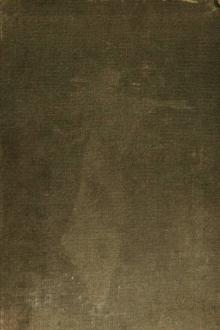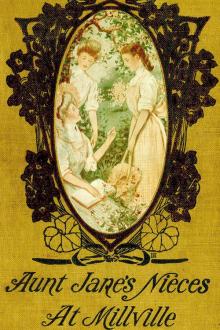Four Ghost Stories by Mrs. Molesworth (big screen ebook reader TXT) 📕

Read free book «Four Ghost Stories by Mrs. Molesworth (big screen ebook reader TXT) 📕» - read online or download for free at americanlibrarybooks.com
- Author: Mrs. Molesworth
- Performer: -
Read book online «Four Ghost Stories by Mrs. Molesworth (big screen ebook reader TXT) 📕». Author - Mrs. Molesworth
"God forbid," said Sir Robert, with a fervency which startled while it reassured me. "It is my profound belief that not only we are something more than our bodies, but that our bodies are the merest outer dress of the real ourselves. It is also my profound belief that at death we—the real we—either enter at once into a state of rest temporarily, or, in some cases—for I do not believe in any cut-and-dry rule independently of individual considerations—are privileged at once to enter upon a sphere of nobler and purer labour," and here the speaker's eyes glowed with a light that was not of this world. "Is it then the least probable, is it not altogether discordant with our 'common sense'—a Divine gift which we may employ fearlessly—to suppose that these real 'selves,' freed from the weight of their discarded garments, would leave either their blissful repose, or, still less, their new activities, to come back to wander about, purposelessly and aimlessly, in this world, at best only perplexing and alarming such as may perceive them? Is it not contrary to all we find of the wisdom and reasonableness of such laws as we do know something about?"
"I have often thought so," I said, "and hitherto this has led me to be very sceptical about all ghost stories."
"But they are often true—so far as they go," he replied. "Our natures are much more complex than we ourselves understand or realise. I cannot now go at all thoroughly into the subject, but to give you a rough idea of my will-o'-the-wisp theory—can you not imagine a sort of shadow, or echo of ourselves, lingering about the scenes we have frequented on this earth, which under certain very rare conditions—the state of the atmosphere among others—may be perceptible to those still 'clothed upon' with this present body? To attempt a simile, I might suggest the perfume that lingers when the flowers are thrown away, the smoke that gradually dissolves after the lamp is extinguished! This is very, very loosely and roughly the sort of thing I mean by my 'will-o'-the-wisps.'"
"I don't like it at all," said Margaret, though she smiled a little. "I think I should be more frightened if I saw that kind of ghost—I mean if I thought it that kind—than by a good, honest, old-fashioned one, who knew what it was about and meant to come."
"But you have just said," he objected, "that they never do seem to know what they are about. Besides, why should you be frightened?—our fears, ourselves in fact—are the only thing we really need be frightened of—our weaknesses and ignorances and folly. There was great truth in that rather ghastly story of Calderra's, allegory though it is, about the man whose evil genius was himself; have you read it?"
We all shook our heads.
"It is ignorance that frightens us," he went on. "In this instance think of the appearances we are speaking of as almost of the nature of a photograph, or the reflection in a looking-glass. I daresay we should have been terrified by these, had we not grown used to them, did we not know what they are. Somebody said lately what appalling things we should think our own shadows, if we had suddenly for the first time become aware of them."
"I don't mind so much," said Margaret, "when you speak of ghosts as a sort of photograph. But——" she hesitated.
"Pray say what you are thinking."
"Just now when you said how incredible it was that real souls should return to this earth, you only spoke of good people, did you not?"
In his turn Sir Robert hesitated.
"It is difficult to draw a line even in thought between good and bad people," he said, "and, thank God, it is not for us to do so. 'To my Maker alone I stand or I fall.' There is evil in the best; there is, I would fain hope," but here his face grew grave and sad, "good in the worst. But even allowing that we could draw the line, is it likely that the bad, even those who have all but lost the last spark, who don't want to be good, is it likely that they, if, as we must believe, under Divine control, would be allowed to leave their new life of punishment—punishment in the sense of correction, mind you—to come back here, wasting their time, one may say, to frighten perfectly innocent people for no purpose? No, I think I am quite consistent. Only try to get rid of all fears—that is what we can all do. But really I should apologise for all this lecture;" and he was turning to me with a smile, when his eyes fell on the cup which he had replaced on the table.
"I cannot get over the impression that I have seen that cup—no, not that cup, but one just like it, before. Not long ago, I fancy," he said.
"Oh, you must let us know if you find out anything," we all exclaimed.
"I certainly shall do so," he said, and a few minutes afterwards he and Mr. Grenfell took their leave.
But I had time for a word or two with the latter out of hearing of the others.
"Who is Sir Robert Masters?" I asked. "Have you known him long? He is a very uncommon and impressive sort of man."
"Yes, I thought you would like him. I have not personally known him long, but he is an old friend of friends of ours. He is of good family, an old baronetcy, but he is not much known in fashionable society. He travels a great deal, or has done so rather, and people say he has 'peculiar ideas,' though that would not go against him in the world. Peculiar ideas, or the cant of them, are rather the fashion it seems to me! But there is no cant about him. And whatever his ideas are," went on young Grenfell warmly, "he is one of the best men I ever knew. He has settled down for some years, and devotes his whole life to doing good, but so quietly and unostentatiously that no one knows how much he does, and others get the credit of it very often."
That was all I heard.
I have never seen Sir Robert again. Still I have by no means arrived yet at the end of my so-called ghost story.
The cup and saucer were carefully washed and replaced in the glass-doored cabinet. The summer gradually waned, and we all returned to our own home. It was at a considerable distance from my sister's, and we met each other principally in the summer time. So, though I did not forget Sir Robert Masters, or his somewhat strange conversation, amid the crowd of daily interests and pleasures, duties and cares, none of the incidents I have here recorded were much in my mind, and but that I had while still in Germany carefully noted the details of all bearing directly or indirectly on "Nora's ghost," as we had come to call it—though it was but rarely alluded to before the child herself—I should not now have been able to give them with circumstantiality.
Fully fifteen months after the visit to my sister, during which we had met Sir Robert, the whole was suddenly and unexpectedly recalled to my memory. Mark and Nora the elder—my sister, that is,—were in their turn staying with us, when one morning at breakfast the post brought for the latter an unusually bulky and important-looking letter. She opened it, glanced at an outer sheet enclosing several pages in a different handwriting, and passed it on to me.
"We must read the rest together," she said in a low voice, glancing at the children, who were at the table. "How interesting it will be!"
The sheet she had handed to me was a short note from Mr. Grenfell. It was dated from some place in Norway where he was fishing, and from whence he had addressed the whole packet to my sister's own home, not knowing of her absence.
"My dear Mrs. Daventry"—it began—"The enclosed will have been a long time of reaching its real destination, for it is, as you will see, really intended for your sister. No doubt it will interest you too, as it has done me, though I am too matter-of-fact and prosaic to enter into such things much. Still it is curious. Please keep the letter; I am sure my friend intends you to do so.
"Yours very truly,
"Ralph Grenfell."
The manuscript enclosed was, of course, from Sir Robert himself. It was in the form of a letter to young Grenfell; and after explaining that he thought it better to write to him, not having my address, he plunged into the real object of his communication.
"You will not," he said, "have forgotten the incident of the 'ghost-cup,' in the summer of last year, and the curious story your friend was so good as to tell us about it. You may remember—Mrs. —— will, I am sure, do so—my strong impression that I had recently seen one like it. After I left you I could not get this feeling out of my head. It is always irritating not to be able, figuratively speaking, 'to lay your hand' on a recollection, and in this instance I really wanted to get the clue, as it might lead to some sort of 'explanation' of the little girl's strange experience. I cudgelled my brains, but all to no purpose; I went over in memory all the houses at which I had visited within a certain space of time; I made lists of all the people I knew interested in 'china,' ancient or modern, and likely to possess specimens of it. But all in vain. All I got for my pains was that people began to think I was developing a new crotchet, or, as I heard one lady say to another, not knowing I was within earshot, 'the poor man must be a little off his head, though till now I have always denied it. But the revulsion from benevolent schemes to china-collecting shows it only too plainly.' So I thought I had better leave off cross-questioning my 'collecting' friends about porcelain and faïence, German ware in particular. And after a while I thought no more about it. Two months ago I had occasion to make a journey to the north—the same journey and to stay at the same house where I have been four or five times since I saw the 'ghost-cup.' But this was what happened this time. There is a junction by which one must pass on this journey. I generally manage to suit my trains so as to avoid waiting there, but this is not always feasible. This time I found that an hour at the junction was inevitable. There is a very good refreshment room there, kept by very civil, decent people. They knew me by sight, and after I had had a cup of tea they proposed to me, as they have done before, to wait in their little parlour just off the public room. 'It would be quieter and more





Comments (0)